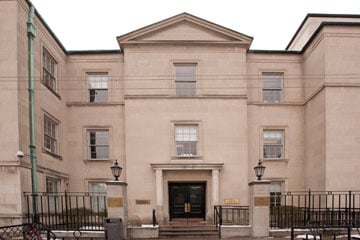The province of Ontario’s Ministry of the Attorney General has backed the Law Society of Upper Canada’s stance not to accredit graduates of Trinity Western University, saying that to do so would be to limit educational opportunities for LGBTQ law students.

The province of Ontario’s Ministry of the Attorney General has backed the Law Society of Upper Canada’s stance not to accredit graduates of Trinity Western University, saying that to do so would be to limit educational opportunities for LGBTQ law students.
The fight over accreditation from the proposed British Columbia-based law school — which has a community covenant that requires students only engage in sexual activity in marriage with someone of an opposite sex — made its way to the Supreme Court earlier this year.
Currently, there are 29 groups listed as interveners in the case between the Law Society of Upper Canada and Trinity Western University, including LGBTQ groups who disagree with the school’s policies and say they are discriminatory.
In the factum submitted by MAG, the province argues that “the religious norms TWU seeks to impose have an adverse impact on minority groups on the basis of gender, marital status, and sexual orientation.”
The factum notes students can be disciplined or suspended for not following the covenant.
“Entry to Canadian law schools is competitive and there are many academically qualified applicants for relatively few law school seats,” says the factum.
“The effect of accrediting TWU would be that persons who are willing to sign the Community Covenant would be provided with greater access to the legal profession in Ontario than persons who will not sign it because of their gender, sexual orientation, or religious beliefs.”
The MAG argues it is in the public interest that the bar is as diverse as possible in Ontario, and having to obey the school’s covenant would limit people who could attend the law school. It contends that this, in turn, would negatively impact the people of Ontario.
“Given that space in accredited law schools is limited, the establishment of an accredited law school that some candidates cannot access because of their sexual orientation or religion means a diminution of the equal access to law schools that LGBTQ and non-evangelical students currently enjoy,” says the factum.
“The LSUC took into account the religious freedom concerns raised by TWU, balanced them against the public interest in ensuring admission to the Bar of Ontario is determined by candidates’ merit, not their religion, gender, or sexual orientation, and came to a reasonable and proportionate decision,” it later adds.
The MAG is not seeking costs.
The factum also notes that the argument is specific to private religious education at law schools, not elementary or high school education.
Law Times has reported on a case where the Human Rights Tribunal of Ontario ruled a Christian pre-school was able to refuse admission to the child of a same-sex couple under s. 18 of the Human Rights Code.
A spokeswoman for the Law Society of Upper Canada said the regulatory body is “in the midst of the process of receiving and responding to the facta of all interveners and will be setting out its position on these facta in the context of that process.”
There is a deadline of Sept. 25 for this process, she said.










